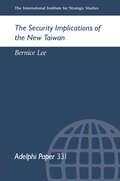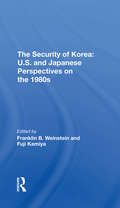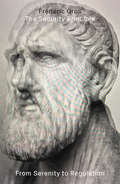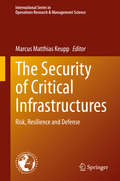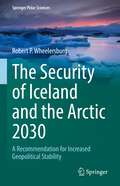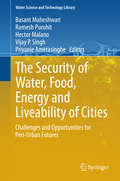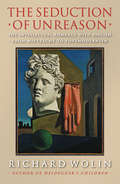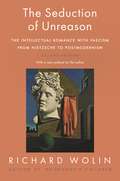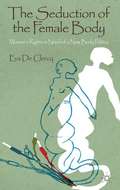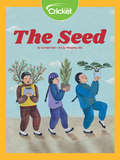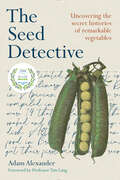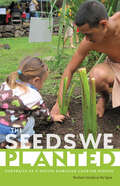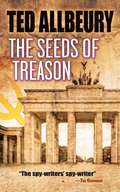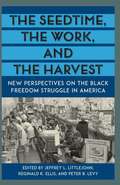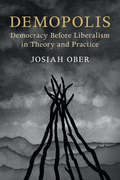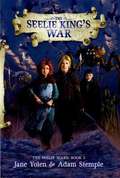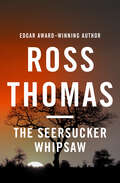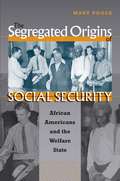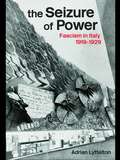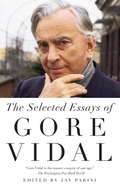- Table View
- List View
The Security Implications of the New Taiwan (Adelphi series #No. 331)
by Bernice LeeHow can fresh conflict between China and Taiwan be avoided? This paper argues that unless the key players - Taiwan, China and the US - accept the existence of a new and increasingly democratic Taiwan, the conflict across the Taiwan Straits will remain one of the most contentious and dangerous in East Asia.
The Security Of Korea: U.s. And Japanese Perspectives On The 1980s
by Franklin B. Weinstein Fuji KamiyaAny discussion of the security of Korea has implications for U.S.-Japan relations, but the Carter administration's announcement in 1977 of its intention to withdraw U.S. ground-combat forces from Korea by 1982, which brought to the surface deep-rooted Japanese and American frustrations with one another, made it clear that neither side fully understood the other's view of Korea. This book, a collaborative effort by specialists of diverse expertise and viewpoints, clarifies U.S. and Japanese perceptions of the Korean problem and explores alternative approaches to the maintenance of peace and security on the Korean peninsula. Demonstrating that much of the conventional wisdom about Korean security rests on oversimplifications, exaggerated fears, and mistaken assumptions, the authors assert that the prospects for avoiding conflict grow brighter despite existing pitfalls, and offer recommendations for the U.S. and Japanese governments.
The Security Principle: From Serenity to Regulation
by Frederic GrosThe genealogy of the idea of security from ancient Greece to the war on terrorismIn The Security Principle, French philosopher Frédéric Gros takes a historical approach to the concept of "security", looking at its evolution from the Stoics to the social network. With lucidity and rigour, Gros's approach is fourfold, looking at security as a mental state, as developed by the Greeks; as an objective situation and absence of all danger, as prevailed in the Middle Ages; as guaranteed by the nation state and its trio of judiciary, police and military; and finally "biosecurity", control, regulation and protection in the flux of contemporary society. In this deeply thought-provoking account, Gros's exploration of security shines a light both on its past meanings as well as its present uses, exposing the contemporary abuses of security and the pervasiveness of it in everyday life in the Global North.
The Security of Critical Infrastructures: Risk, Resilience and Defense (International Series in Operations Research & Management Science #288)
by Marcus Matthias KeuppThis book analyzes the security of critical infrastructures such as road, rail, water, health, and electricity networks that are vital for a nation’s society and economy, and assesses the resilience of these networks to intentional attacks. The book combines the analytical capabilities of experts in operations research and management, economics, risk analysis, and defense management, and presents graph theoretical analysis, advanced statistics, and applied modeling methods. In many chapters, the authors provide reproducible code that is available from the publisher’s website. Lastly, the book identifies and discusses implications for risk assessment, policy, and insurability. The insights it offers are globally applicable, and not limited to particular locations, countries or contexts. Researchers, intelligence analysts, homeland security staff, and professionals who operate critical infrastructures will greatly benefit from the methods, models and findings presented. While each of the twelve chapters is self-contained, taken together they provide a sound basis for informed decision-making and more effective operations, policy, and defense.
The Security of Iceland and the Arctic 2030: A Recommendation for Increased Geopolitical Stability (Springer Polar Sciences)
by Robert P. WheelersburgThis book outlines a recommended Icelandic security force as part of the country’s defence against sub-strategic threats such as human trafficking by criminals or border incursions by other states. It also tests the recommended security force through the development of four different hypothetical scenarios in the year 2030 designed to show the force’s successful implementation. Melting of the Arctic ice pack, and the opening of the Transpolar Sea Route around 2025 could lead to an increase in traffic into the North Atlantic from the Pacific (and vice versa). That movement is predicted to bring a massive influx of tourists, business interests, and government entities into the region. Along with legitimate uses of the new shipping lanes, the opportunity for terrorists, criminals, and rogue states to travel in and around the Arctic could lead to increased smuggling, violence, and sovereignty disputes (i.e., seizing uninhabited terrain). A review of Iceland’s current security policies indicates that the parliament provided the legal framework to create the recommended security force with the 2016 Parliamentary Resolution establishing a National Security Policy for Iceland. Many scholars and government officials believe that the Iceland public would not support a security force culturally. Yet, recent surveys reveal that many Icelanders could accept a security force to protect them from sub-strategic threats, especially if the increased security could be attained without the intervention of foreign military forces. The recommended security force utilizes Icelandic search-and-rescue volunteers and Reservists to increase the protection of the country funded by its full NATO contribution.
The Security of Water, Food, Energy and Liveability of Cities
by Vijay P. Singh Basant Maheshwari Ramesh Purohit Hector Malano Priyanie AmerasingheThe population of cities around the world is growing at an alarming rate, and as a result the landscapes of most cities are going through enormous changes. In particular, fertile agricultural lands at the periphery of cities are being developed without consideration of holistic planning. As such, peri-urban areas, zones of transition from rural to urban land uses located between the outer limits of the urban and the rural environment are experiencing significant losses of agricultural land, increased runoff, and water quality degradation. Concurrently, the demands for water, food and energy are increasing within cities, and unless a balance is struck the liveability of these cities will soon be compromised. The current water and land use changes have serious consequences on lifestyle, environment, health and overall well-being of urban communities. This book therefore helps readers to understand the current issues and challenges and examines suitable strategies and practices to cope with current and future pressures of urbanisation and peri-urban land-use changes. The book examines a number of critical aspects in relation to the future of cities and peri-urban regions, including the suitability of policies and institutions to sustain cities into the future; impact of current trends in land use change, population increase and water demand; long term planning needs and approaches to ensure the secured future for generations ahead; and strategies to adapt the cities and land uses so that they remain viable and liveable. The readership of the book will include policy makers, urban planners, researchers, post-graduate students in urban planning and environmental and water resources management and managers in municipal councils.
The Seduction of Brazil: The Americanization of Brazil During World War II
by Antonio Pedro TotaFollowing completion of the U. S. air base in Natal, Brazil, in 1942, U. S. airmen departing for North Africa during World War II communicated with Brazilian mechanics with a thumbs-up before starting their engines. This sign soon replaced the Brazilian tradition of touching the earlobe to indicate agreement, friendship, and all that was positive and good - yet another indication of the Americanization of Brazil under way during this period. In this translation of O Imperialismo Sedutor, Antonio Pedro Tota considers both the Good Neighbor Policy and broader cultural influences to argue against simplistic theories of U. S. cultural imperialism and exploitation. He shows that Brazilians actively interpreted, negotiated, and re-configured U. S. culture in a process of cultural recombination. The market, he argues, was far more important in determining the nature of this cultural exchange than state-directed propaganda efforts because Brazil already was primed to adopt and disseminate American culture within the framework of its own rapidly expanding market for mass culture. By examining the motives and strategies behind rising U. S. influence and its relationship to a simultaneous process of cultural and political centralization in Brazil, Tota shows that these processes were not contradictory, but rather mutually reinforcing. The Seduction of Brazil brings greater sophistication to both Brazilian and American understanding of the forces at play during this period, and should appeal to historians as well as students of Latin America, culture, and communications.
The Seduction of Unreason: The Intellectual Romance with Fascism from Nietzsche to Postmodernism
by Richard WolinFifteen years ago, revelations about the political misdeeds of Martin Heidegger and Paul de Man sent shock waves throughout European and North American intellectual circles. Ever since, postmodernism has been haunted by the specter of a compromised past. In this intellectual genealogy of the postmodern spirit, Richard Wolin shows that postmodernism's infatuation with fascism has been widespread and not incidental. He calls into question postmodernism's claim to have inherited the mantle of the left--and suggests that postmodern thought has long been smitten with the opposite end of the political spectrum.In probing chapters on C. G. Jung, Hans-Georg Gadamer, Georges Bataille, and Maurice Blanchot, Wolin discovers an unsettling commonality: during the 1930s, these thinkers leaned to the right and were tainted by a proverbial "fascination with fascism." Frustrated by democracy's shortcomings, they were seduced by fascism's grandiose promises of political regeneration. The dictatorships in Italy and Germany promised redemption from the uncertainties of political liberalism. But, from the beginning, there could be no doubting their brutal methods of racism, violence, and imperial conquest.Postmodernism's origins among the profascist literati of the 1930s reveal a dark political patrimony. The unspoken affinities between Counter-Enlightenment and postmodernism constitute the guiding thread of Wolin's suggestive narrative. In their mutual hostility toward reason and democracy, postmodernists and the advocates of Counter-Enlightenment betray a telltale strategic alliance--they cohabit the fraught terrain where far left and far right intersect.Those who take Wolin's conclusions to heart will never view the history of modern thought in quite the same way.
The Seduction of Unreason: The Intellectual Romance with Fascism from Nietzsche to Postmodernism, Second Edition
by Richard WolinEver since the shocking revelations of the fascist ties of Martin Heidegger and Paul de Man, postmodernism has been haunted by the specter of a compromised past. In this intellectual genealogy of the postmodern spirit, Richard Wolin shows that postmodernism’s infatuation with fascism has been extensive and widespread. He questions postmodernism’s claim to have inherited the mantle of the Left, suggesting instead that it has long been enamored with the opposite end of the political spectrum. Wolin reveals how, during in the 1930s, C. G. Jung, Hans-Georg Gadamer, Georges Bataille, and Maurice Blanchot were seduced by fascism's promise of political regeneration and how this misapprehension affected the intellectual core of their work. The result is a compelling and unsettling reinterpretation of the history of modern thought. In a new preface, Wolin revisits this illiberal intellectual lineage in light of the contemporary resurgence of political authoritarianism.
The Seduction of the Female Body
by Eva De ClercqDrawing on the ambiguous meaning of the notion of vulnerability, the book offers an innovative approach to the topic of the female body in relation to women's rights; going beyond the age-old dichotomy of casting women as either passive victims or conscious agents.
The Seed
by Carolyn HanIt is time for the Chinese emperor to choose his successor. Instead of one of his lazy sons, he decides to choose someone who is not from the royal family and devises a special test. Who will be worthy to become the next emperor?
The Seed Detective: Uncovering the Secret Histories of Remarkable Vegetables
by Adam Alexander‘Informative, enlightening and entertaining but also important.’ Mark Diacono ‘One of the most inspirational books I have encountered.’ Darina Allen ‘If you’re a vegetable growing addict or just curious about their origins, there’s something for everyone in Adam’s new book.’ Rob Smith, TV presenter 'The writing is rich . . . [This book] is a clarion call to think about our food in new ways and carefully consider where it comes from.' New Scientist Meet the Indiana Jones of vegetables on his quest to save our heritage produce. Have you ever wondered how everyday staples such as peas, kale, asparagus, beans, squash and sweetcorn ended up on our plates? Well, so did Adam Alexander. Adam’s passion for heritage vegetables was ignited when he tasted an unusual, sweet and fiery pepper while on a filmmaking project in Ukraine. Smitten by its flavour, he began to seek out local growers of old and near-forgotten varieties in a mission to bring home seeds to grow and share – saving them from being lost forever. In The Seed Detective, Adam tells of his far flung (and closer to home) seed-hunting adventures and reveals the stories behind many of our everyday vegetable heroes. How the common garden pea was domesticated from three wild species over 8,500 years ago, that the first carrots originated in Afghanistan (and were actually purple or red in colour), how Egyptian priests considered it a crime to look at a fava bean and that the Romans were fanatical about asparagus. Join The Seed Detective as he takes us on a journey that began when we left the life of hunter-gatherers to become farmers. Sharing storiesof globalisation, political intrigue, colonisation and serendipity, Adam shows us the vital part vegetables have played in our food story – and how they are the key to our future.
The Seed Detective: Uncovering the Secret Histories of Remarkable Vegetables
by Adam AlexanderMeet the Indiana Jones of vegetables and join him on his quest to save our heritage produce.Named BBC Radio 4's The Food Programme "Book of the Year"2023 GardenComm Media Awards Silver Laurel Medal of AchievementShortlisted for the Garden Media Guild&’s Garden Book of the Year Award 2023Longlisted for The Art of Eating Prize 2023"[This book] is a clarion call to think about our food in new ways and carefully consider where it comes from."—New ScientistDid you ever wonder how peas, kale, asparagus, beans, squash, and corn have ended up on our plates? Well, so did Adam Alexander.Adam Alexander is The Seed Detective. His passion for vegetables was ignited when he tasted an unusual sweet pepper with a fiery heart while on a filmmaking project in Ukraine. Smitten by its flavor, Adam began to seek out local growers of endangered heritage and heirloom varieties in a mission to bring home seeds to grow, share, and return so that he could enjoy their delicious taste—and save them from being lost forever.In The Seed Detective, Adam shares his own stories of seed hunting, with the origin stories behind many of our everyday food heroes. Taking us on a journey that began when we left the life of the hunter-gatherer to become farmers, he tells tales of globalization, political intrigue, colonization, and serendipity—describing how these vegetables and their travels have become embedded in our food cultures.&“We are a nation of vegetable growers and this book explores the wonderful world of rare and endangered heritage and heirloom vegetables – and why we must keep growing them and saving their seed, not only for our gardening and culinary pleasure, but to pass these stories on – vegetables are truly our history on a plate.&”—The Seed Detective"Copious but thoroughly engaging research . . . Alexander shares his excitement over the potential for rescuing this lost heritage. . . All of which makes this title worth a serious look."—Booklist (starred)"[The Seed Detective] traces the origins and evolution of vegetables that have shaped human civilization."—Atlas Obscura&“[A] spirited introduction to the contemporary seed-saving movement. . . . With entertaining anecdotes that feature Syrian fava beans, Ukrainian sweet peppers and broad beans from Myanmar, Alexander's horticultural adventures will surely stimulate and unleash readers' inner gardeners.&”—Shelf Awareness"For Adam Alexander seeds are more than just a job, hobby or passion. They&’re a lifeline."—Modern Farmer
The Seeds We Planted: Portraits of a Native Hawaiian Charter School (First Peoples: New Directions in Indigenous Studies)
by Noelani Goodyear-Ka'opuaIn 1999, Noelani Goodyear-Ka&‘ōpua was among a group of young educators and parents who founded Hālau Kū Māna, a secondary school that remains one of the only Hawaiian culture-based charter schools in urban Honolulu. The Seeds We Planted tells the story of Hālau Kū Māna against the backdrop of the Hawaiian struggle for self-determination and the U.S. charter school movement, revealing a critical tension: the successes of a school celebrating indigenous culture are measured by the standards of settler colonialism.How, Goodyear-Ka&‘ōpua asks, does an indigenous people use schooling to maintain and transform a common sense of purpose and interconnection of nationhood in the face of forces of imperialism and colonialism? What roles do race, gender, and place play in these processes? Her book, with its richly descriptive portrait of indigenous education in one community, offers practical answers steeped in the remarkable—and largely suppressed—history of Hawaiian popular learning and literacy. This uniquely Hawaiian experience addresses broader concerns about what it means to enact indigenous cultural–political resurgence while working within and against settler colonial structures. Ultimately, The Seeds We Planted shows that indigenous education can foster collective renewal and continuity.
The Seeds of Treason
by Ted Allbeury"Intricate and compelling … Ted Allbeury is one of the most skilled wordsmiths we've got, ranking with le Carré, Deighton, Forsyth, and Gardner." — The Gloucester Citizen, U.K. "Ted Allbeury is one of our best spy writers, quiet, thoughtful, and menacingly compelling." — The Birmingham Post, U.K."Absorbing and sturdily crafted." — The Literary ReviewA gripping tale of love and treachery, this novel by a former British intelligence officer explores the reasons why men and women betray their countries and each other. The cast includes Jan Massey, Head of British Intelligence in Berlin and a passionate anti-Communist who falls in love with the wife of a KGB officer; Arthur Johnson, a lowly signalman in the Berlin office who dreams of money and power; civil servant Eric Mayhew, stung by an unjust act of authority; and mathematician Jimbo Vick, lured into betrayal by a seductive Soviet agent. Although they operate under different motivations and circumstances, their roles in the intelligence community will connect them as they frantically attempt to evade a day of reckoning."No one twitches the strings more expertly than Allbeury," noted The Observer, and indeed, Ted Allbeury's experience as a Cold War–era spy adds a thrilling realism to this story of the egotism, passion, and desperation that underlie acts of treason.
The Seedtime, the Work, and the Harvest: New Perspectives on the Black Freedom Struggle in America (Southern Dissent)
by Peter B. Levy Jeffrey L. Littlejohn Reginald K. EllisThis volume's contributors expand the chronology and geography of the black freedom struggle beyond the traditional emphasis on the Jim Crow South and the years between 1954 and 1968. Beginning as far back as the nineteenth century, and analyzing case studies from southern, northern, and border states, the essays in The Seedtime, the Work, and the Harvest incorporate communities and topics not usually linked to the African American civil rights movement. The collection opens with a biographical sketch of Thomas DeSaille Tucker, an educational pioneer who served as the first president of Florida State Normal and Industrial School for Colored Students. It then highlights the work of black women, including Bostonian publisher Josephine St. Pierre Ruffin, who defied local governments during the Progressive Era by disseminating medical information and providing access to medical professionals. Next, the collection explores the life and work of Norfolk civil rights attorney James F. Gay, who helped to democratize the political establishment in Virginia’s largest city but became a victim of his own success. The collection then moves to York, Pennsylvania, to examine a 1969 riot that went mostly unnoticed until the town's mayor was charged--more than thirty years later--with the riot-related murder of Lillie Belle Allen. Also featured is an essay examining the Student Nonviolent Coordinating Committee's "Food for Freedom" campaign that aimed to complement voter registration work in Mississippi by providing everyday sustenance to African Americans. Addressing more recent issues, this volume considers the politics of public memory in Baltimore, Maryland, a city divided by racial "riots" in 1968 and in 2015. It then examines the Black Lives Matter movement that gained international attention for its response to Michael Brown's death at the hands of police in Ferguson, Missouri, as well as the Sandra Bland Movement inspired by the arrest of Bland and her subsequent death in the Waller County jail in rural Texas. These chapters connect the activism of today--shaped in so many ways by social media, student activism, and grassroots organization--to a deeply historical, wide-ranging fight for equality.
The Seeley Lectures: Democracy before Liberalism in Theory and Practice (The Seeley Lectures)
by Josiah OberWhat did democracy mean before liberalism? What are the consequences for our lives today? Combining history with political theory, this book restores the core meaning of democracy as collective and limited self-government by citizens. That, rather than majority tyranny, is what democracy meant in ancient Athens, before liberalism. Participatory self-government is the basis of political practice in 'Demopolis', a hypothetical modern state powerfully imagined by award-winning historian and political scientist Josiah Ober. Demopolis' residents aim to establish a secure, prosperous, and non-tyrannical community, where citizens govern as a collective, both directly and through representatives, and willingly assume the costs of self-government because doing so benefits them, both as a group and individually. Basic democracy, as exemplified in real Athens and imagined Demopolis, can provide a stable foundation for a liberal state. It also offers a possible way forward for religious societies seeking a realistic alternative to autocracy.
The Seeley Lectures: The Politics of the Human
by Anne PhillipsThe human is a central reference point for human rights. But who or what is that human? And given its long history of exclusiveness, when so many of those now recognised as human were denied the name, how much confidence can we attach to the term? This book works towards a sense of the human that does without substantive accounts of 'humanity' while also avoiding their opposite – the contentless versions that deny important differences such as race, gender and sexuality. Drawing inspiration from Hannah Arendt's anti-foundationalism, Phillips rejects the idea of 'humanness' as grounded in essential characteristics we can be shown to share. She stresses instead the human as claim and commitment, as enactment and politics of equality. In doing so, she engages with a range of contemporary debates on human dignity, humanism, and post-humanism, and argues that none of these is necessary to a strong politics of the human.
The Seeley Lectures: The Sleeping Sovereign
by Richard TuckRichard Tuck traces the history of the distinction between sovereignty and government and its relevance to the development of democratic thought. Tuck shows that this was a central issue in the political debates of the seventeenth and eighteenth centuries, and provides a new interpretation of the political thought of Bodin, Hobbes and Rousseau. Integrating legal theory and the history of political thought, he also provides one of the first modern histories of the constitutional referendum, and shows the importance of the United States in the history of the referendum. The book derives from the John Robert Seeley Lectures delivered by Richard Tuck at the University of Cambridge in 2012, and will appeal to students and scholars of the history of ideas, political theory and political philosophy.
The Seelie King's War
by Jane Yolen Adam StempleThe exciting conclusion to the Seelie Wars trilogy. Full of magic, battles, and page-turning excitement, this series is a perfect introduction to classic fantasy.The war that Prince Aspen and midwife's apprentice Snail started--purely by accident--is at hand. The Unseelie Army, the evil side of Faerie, will soon invade and destroy the Seelie kingdom. Aspen is terrified, not simply because his homeland is on the verge of ruin, but because he is now, after the death of his father and brothers, the Seelie King. He is a young, untried king; a king without a battle plan. But he has Snail, his first and only friend, and the only one who can raise the army Aspen needs--an army of changelings, like her. First, however, she has to convince the mysterious, dangerous Professor Odds, the changelings' leader, who has a destructive plan of his own.
The Seersucker Whipsaw
by Ross ThomasFrom the Edgar Award–winning author: &“[A] highly readable novel of political adventure . . . a cracking good story and the Africa mentality is fascinating&” (Kirkus Reviews). Clinton Shartelle doesn&’t seem like a good choice to run a political campaign in Albertia. For one thing, he&’s American, and Albertia is a small coastal republic in Africa, about to be cut loose from the English Crown. For another, Shartelle is Southern and fiercely proud of it, and his ideas about racial politics veer unpredictably from progressive to rigidly old-fashioned. But Shartelle is the best, and the political future of Albertia is too important to be left to anyone else. If history is any indication, this first fair election will probably be the country&’s last. Rich natural resources make it attractive to businessmen on both sides of the Atlantic, opening Albertia up to political corruption. For his part, Shartelle is hired to make sure that a British industrialist&’s favored candidate wins the presidency. But the opposition is backed by the CIA, for whom murder is just another political tool.
The Seersucker Whipsaw: A Novel (Mysterious Press-highbridge Audio Classics Ser.)
by Ross ThomasFrom the Edgar Award–winning author: &“[A] highly readable novel of political adventure . . . a cracking good story and the Africa mentality is fascinating&” (Kirkus Reviews). Clinton Shartelle doesn&’t seem like a good choice to run a political campaign in Albertia. For one thing, he&’s American, and Albertia is a small coastal republic in Africa, about to be cut loose from the English Crown. For another, Shartelle is Southern and fiercely proud of it, and his ideas about racial politics veer unpredictably from progressive to rigidly old-fashioned. But Shartelle is the best, and the political future of Albertia is too important to be left to anyone else. If history is any indication, this first fair election will probably be the country&’s last. Rich natural resources make it attractive to businessmen on both sides of the Atlantic, opening Albertia up to political corruption. For his part, Shartelle is hired to make sure that a British industrialist&’s favored candidate wins the presidency. But the opposition is backed by the CIA, for whom murder is just another political tool.
The Segregated Origins of Social Security
by Mary PooleThe relationship between welfare and racial inequality has long been understood as a fight between liberal and conservative forces. In The Segregated Origins of Social Security, Mary Poole challenges that basic assumption. Meticulously reconstructing the behind-the-scenes politicking that gave birth to the 1935 Social Security Act, Poole demonstrates that segregation was built into the very foundation of the welfare state because white policy makers--both liberal and conservative--shared an interest in preserving white race privilege. Although northern white liberals were theoretically sympathetic to the plight of African Americans, Poole says, their primary aim was to save the American economy by salvaging the pride of America's "essential" white male industrial workers. The liberal framers of the Social Security Act elevated the status of Unemployment Insurance and Social Security--and the white workers they were designed to serve--by differentiating them from welfare programs, which served black workers.Revising the standard story of the racialized politics of Roosevelt's New Deal, Poole's arguments also reshape our understanding of the role of public policy in race relations in the twentieth century, laying bare the assumptions that must be challenged if we hope to put an end to racial inequality in the twenty-first.
The Seizure of Power: Fascism in Italy, 1919-1929 (Totalitarianism Movements and Political Religions)
by Professor Adrian Lyttelton Adrian LytteltonThis volume is a study of Fascism in its country of origin, Italy. It describes the impact of a new type of political movement on Italian government and society. The Fascist seizure of power did not begin or end with Mussolini's famous March on Rome in 1922; it was achieved rather by gradual subversion of the liberal order, which involved not only the destruction of all political opposition but also the creation of new institutions designed to control economic and cultural life. A classic work of wide-ranging scholarship, this book is here republished with a new preface by the author and will be essential reading for all students of Fascism and international history.
The Selected Essays of Gore Vidal
by Gore VidalGore Vidal—novelist, playwright, critic, screenwriter, memoirist, indefatigable political commentator, and controversialist—is America's premier man of letters. No other living writer brings more sparkling wit, vast learning, indelible personality, and provocative mirth to the job of writing an essay. This long-needed volume comprises some twenty-four of his forays into criticism, reviewing, political commentary, memoir, portraiture, and, occasionally, unfettered score settling. Among them are such classics as "The Top Ten Best-Sellers," “Dawn Powell: The American Writer,” “Theodore Roosevelt: An American Sissy," "Pornography," and "The Second American Revolution. ” Edited and introduced by Gore Vidal's literary executor, Jay Parini, it will stand as one of the most enjoyable and durable works from the hand and mind of this vastly accomplished and entertaining immortal of American literature.
